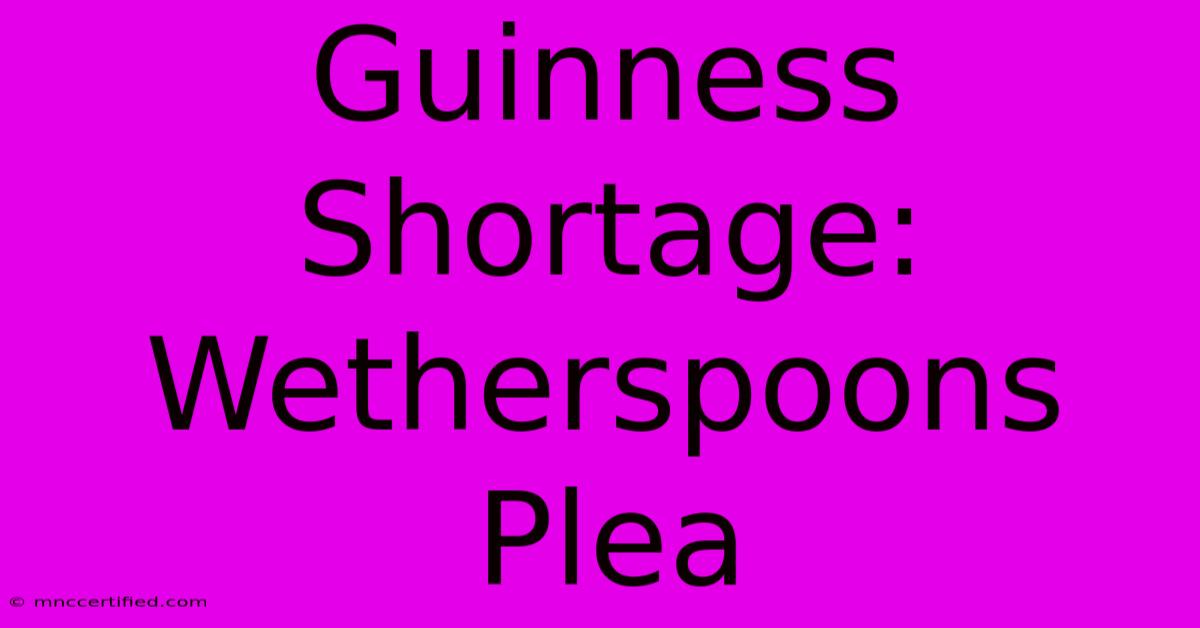Guinness Shortage: Wetherspoons Plea

Table of Contents
Guinness Shortage: Wetherspoon's Plea Highlights Supply Chain Woes
The recent announcement of a Guinness shortage in the UK has sent ripples through the pub industry, with Wetherspoon's, one of the country's largest pub chains, leading the calls for solutions. This isn't just a temporary hiccup; it highlights deeper issues within the UK's supply chain and the complexities of importing and distributing beloved beverages. Let's delve into the details of this pint-sized crisis and explore its wider implications.
The Wetherspoon's Plea and the Guinness Shortage
JD Wetherspoon, better known as Wetherspoon's, a prominent pub chain renowned for its affordable drinks and hearty meals, has publicly voiced concerns over the dwindling supply of Guinness. The shortage, affecting pubs nationwide, has left many fearing that the iconic stout could be absent from their local for some time. Wetherspoon's plea underscores the severity of the situation and the potential impact on their business, as Guinness is a popular choice amongst their clientele. Their public statement acts as a powerful signal, drawing attention to the wider issue and potentially pressuring Diageo, the producer of Guinness, to address the problem swiftly.
Causes of the Guinness Shortage: A Perfect Storm
Several factors contribute to the current Guinness shortage. It's not simply one single cause, but rather a confluence of issues:
1. Supply Chain Disruptions:
Post-pandemic logistical challenges continue to plague global supply chains. Increased shipping costs, driver shortages, and port congestion all contribute to delayed deliveries, impacting the timely arrival of Guinness in the UK. These disruptions are not unique to Guinness; many industries are facing similar problems.
2. Increased Demand:
The easing of COVID-19 restrictions has seen a surge in demand for alcoholic beverages, including Guinness. This renewed thirst for socializing and pub visits has strained existing supply chains, exacerbating the impact of pre-existing logistical challenges.
3. Brexit Impact:
The UK's departure from the European Union has undoubtedly added complexity to the import process. New customs checks and regulations have created bottlenecks, further delaying the delivery of goods, including Guinness, from Ireland. This factor is particularly relevant given Guinness's Irish origins.
4. Production Bottlenecks:
While not explicitly confirmed, potential production issues at the Guinness brewery itself could also be playing a role, though this is less publicly discussed than the supply chain problems.
What Does This Mean for Pubs and Consumers?
The Guinness shortage presents significant challenges for pubs and consumers alike. Pubs face potential revenue losses, as Guinness is a popular and profitable drink. Consumers may experience disappointment, unable to enjoy their usual pint of the black stuff. The shortage also raises concerns about the availability of other popular drinks in the future, highlighting the fragility of the UK's beverage supply chain.
Looking Ahead: Solutions and Long-Term Implications
Addressing the Guinness shortage requires a multi-pronged approach. Diageo, the producer, needs to work closely with its distributors to streamline the supply chain, mitigating the impact of logistical challenges. Improved communication and collaboration between breweries, distributors, and pubs are crucial to ensure a more resilient supply system. The UK government might also consider implementing policies to alleviate some of the Brexit-related import hurdles.
This situation serves as a stark reminder of the interconnectedness of global supply chains and the potential vulnerability of businesses relying on imported goods. It also underscores the importance of diversified sourcing and robust contingency planning to mitigate the risks of future shortages.
Keywords:
Guinness shortage, Wetherspoons, pub, UK, supply chain, Diageo, Ireland, Brexit, beer shortage, logistics, import, export, drinks shortage, alcoholic beverage, pub crisis, supply chain disruption, production bottleneck, pint, stout.
Note: This article is optimized for SEO using relevant keywords throughout the text naturally. Remember to conduct further keyword research specific to your target audience and platform for optimal results. Include relevant images and internal/external links where appropriate to further boost SEO. Off-page SEO strategies such as building backlinks from reputable sources should also be employed for improved search engine rankings.

Thank you for visiting our website wich cover about Guinness Shortage: Wetherspoons Plea. We hope the information provided has been useful to you. Feel free to contact us if you have any questions or need further assistance. See you next time and dont miss to bookmark.
Featured Posts
-
Injury Crisis Mc Kennies Cagliari Task
Dec 18, 2024
-
From Misfit To Legend Mark Cavendish
Dec 18, 2024
-
Unfortunate Update I Must Inform You
Dec 18, 2024
-
Conor Mc Gregor Vs Logan Paul Boxing
Dec 18, 2024
-
Caleb Williams Dads Bears Prediction
Dec 18, 2024